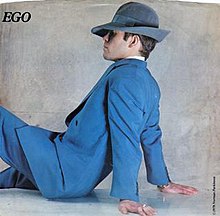This article needs additional citations for verification .(October 2020) |
| "Ego" | ||||
|---|---|---|---|---|
 | ||||
| Single by Elton John | ||||
| B-side | Flinstone Boy | |||
| Released | 31 March 1978 [1] | |||
| Recorded | January–March 1978 | |||
| Genre | Glam rock [2] | |||
| Length | 4:00 | |||
| Label | MCA (US) Rocket (UK) | |||
| Songwriter(s) | Elton John, Bernie Taupin | |||
| Elton John singles chronology | ||||
| ||||
"Ego" is a 1978 song performed by English musician Elton John, written by John and Bernie Taupin. It was released in early 1978 as a standalone single, and did not appear on the album released in the same year, A Single Man . John played this song live from 1978 up until 1980. [3] The single reached #34 in both the UK and the US. [4]
Contents
The song was not available on CD until the 1990 release of To Be Continued box set. Later, in remastered form, it was added to the reissue of A Single Man along with four B-sides from the era.